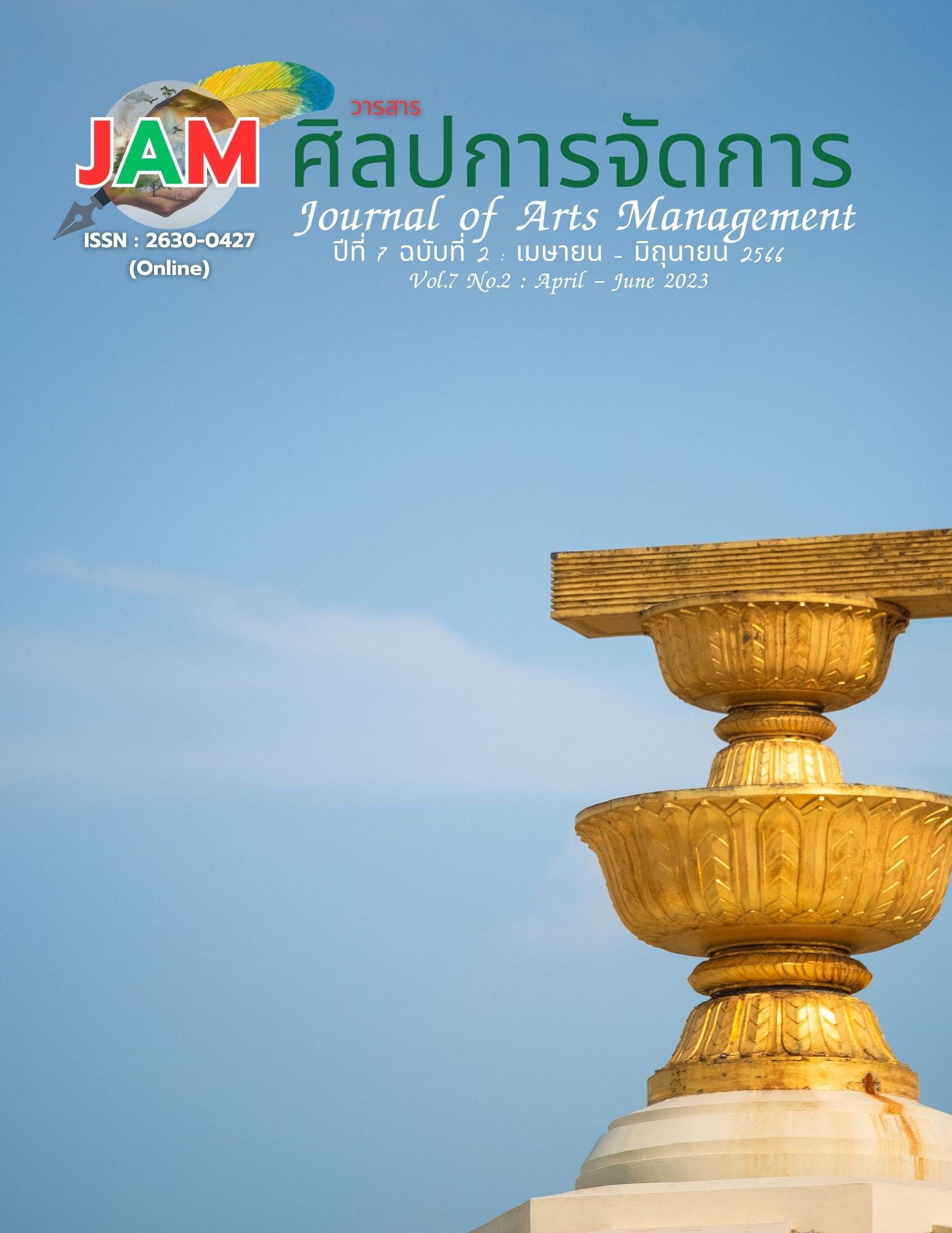The Causal Relationship Model of the Best Practice for SMEs of the Thai Tourism Industry in Crisis and Business Continuity
Main Article Content
Abstract
The objectives of this quantitative research were 1) to study and develop a causal relationship model of the best practices for small and medium enterprises (SMEs) and 2) to examine the consistency of the causal relationship model of the best practices for SMEs of the Thai tourism industry in crisis and business continuity with empirical data. Collecting data with 770 sample sizes from staff in SMEs of 3 businesses in the Thai tourism industry, namely, hotel businesses, restaurant businesses, and tour operator and travel agency businesses in Thailand, using by multi-stage sampling. The instrument for collecting data was the questionnaire which had a reliability of 0.97. Data were analyzed using frequency, percentage, mean, standard deviation, Pearson's product moment correlation coefficient, and structural equation modeling (SEM). A causal relationship analysis was performed to determine the path of influence of the variables: 1) Business Model Canvas (BMC) 2) Business Continuity Plan (BCP) 3) Crisis Management (CM) 4) New Normal Concept (NN) and Best Practice. (BP). The findings revealed that the established causal relationship model was very consistent with the empirical data. The Chi-Squares statistics for the structural equation model were statistics 2 = 462.98 df = 507 p = .919 GFI = .966 AGFI = .960 RMR = .740.
Article Details

This work is licensed under a Creative Commons Attribution-NonCommercial-NoDerivatives 4.0 International License.
Views and opinions appearing in articles in the Journal of Arts of Management It is the responsibility of the author of the article. and does not constitute the view and responsibility of the editorial team I agree that the article is copyright of the Arts and Management Journal.
References
Angsuchot, S., Wichitwanna, S., & Pinyopanuwat, R. (2011). Statistical for Social Science and Behavioral Research: Techniques for LISREL Programs (3rd ed.). Bangkok: Charoen Dee Munkong Printing.
Asia-Pacific Economic Corporation: APEC. (2014). Guidebook on SME Business Continuity Planning. APEC SME Crisis Management Center, Taipei, Taiwan.
Aungvaravong. C., & Yanakittkul. P, (2017). Business Model Analysis of Health-Supplement Product from The Organic Rice-Powder Drink. University of the Thai Chamber of Commerce Journal, Humanities and Social Sciences, 37(4), 92-109.
Bollen, K.A. (1989). Structural Equations with Latent Variables. John Wiley & Sons.
Chaiphakdee, W. (2019). The Best Practices in Administration of Thanphuyingchathimaphuegbarami School under Her Royal Highness Princess Maha Chakri Sirindhorn’s Projects, Bureau of the Royal Household[Doctoral Dissertation, Silpakorn University].
Chalermdan, N. (2020). Consumers’ Behavior on Buying Delivery Food Via Mobile Application During New Species of Corona Virus 2019 (COVID-19) in Bangkok. Journal of Industrial Business Administration, 2(1), 92-106.
Clark, T., Osterwalder, A., & Pigneur, Y. (2012). Business Model You: A One-Page Method for Reinventing Your Career. John Wiley & Sons.
Department of Business Development. (2020). The COVID-19 Pandemic has Pushed the Food Delivery Restaurant Business to Grow by Leaps and Bounds. https://www.dbd.go.th/news_view.php?nid=469417268
Glaesser, D. (2006). Crisis Management in the Tourism Industry. Butterworth-Heinemann, UK.
Hair, J.F., Black, W.C., Babin, B.J., & Anderson, R.E. (2010). Multivariate Data Analysis (7th ed.). Pearson.
Horthong, G. (2020, May 19). The New Normal Theory that will Happen After COVID-19. AD Addict. https://adaddictth.com/knowledge/60-New-Normal-Covid
Israeli, A. A. (2007). Crisis-management Practices in the Restaurant Industry. International Journal of Hospitality Management, 26(4), 807-823.
Jöreskog, K.G., & Sörbom, D. (2004). LISREL 8.7 for Windows [Computer software]. Lincolnwood, IL: Scientific Software International,Inc.
Kato, M., & Charoenrat, T. (2018). Business Continuity Management of Small and Medium Sized Enterprises: Evidence from Thailand. International Journal of Disaster Risk Reduction, 27, 577-587. https://doi.org/10.1016/j.ijdrr.2017.10.002
Kukanja, M., Planinc, T., & Sikošek, M. (2020) Crisis Management Practices in Tourism SMEs During the Covid-19 Pandemic. Organizacija, 53(4), 346–361.
Le Chi Cong., & Dao Anh Thu. (2021). The Competitiveness of Small and Medium Enterprises in the Tourism Sector: The Role of Leadership Competencies. Journal of Economics and Development, 23(3), 299-316. DOI: 10.1108/JED-06-2020-0080
Office of Small and Medium Enterprise Promotion. (2016). Guidelines for Collecting Data on Performance Monitoring Indicators and Project Monitoring for Small and Medium-sized Enterprises. https://www.sme.go.th/upload/mod_download/download-
Office of Small and Medium Enterprise Promotion. (2018). SMEs Promotion Plan No. 4 (2017-2021). https://www.sme.go.th/en/page.php?modulekey=369
Office of Small and Medium Enterprise Promotion. (2019). Small and Medium Situation Report 2019: SME Speed Up, More Knowledge More Chance. www.sme.go.th
Office of Small and Medium Enterprise Promotion. (2021). MSME Situation Report Q4 /2021. https://sme.go.th/upload/mod_download/download-20220128150846.pdf
Ojasalo, J., & Ojasalo, K. (2018). Service Logic Business Model Canvas. Journal of Research in Marketing and Entrepreneurship (JRME), Emerald Publishing Limited. 70-98.
Osterwalder, A., & Pigneur, Y. (2010). Business Model Generation: A Handbook for Visionaries, Game Changers, and Challengers. John Wiley & Sons.
Pforr, C., & Hosie, P. (2009). Crisis Management in the Tourism Industry Beating the Odds?. Ashgate.
Rugmai, S., Lertkultanon, Y., Hannon, K., & Montrisuksirikul, K. (2017). Crisis Management in Hotel Business. Dusit Thani College Journal, 11(1), 345-354.
Semerciöz, F., Pehlivan, Ç., Sözüer, A., & Mertd, A. (2015). Crisis Management Practices and Strategic Responses Through Customer Loyalty and Price Strategy in Hard Times: Evidence from Fine-dining Restaurants. Procedia-Social and Behavioral Sciences, 207, 149–156.
Senanuch, S. (2014). Removing Best Practices Lessons. Thailand Productivity Institute.
Srihirun, J. (2017). Risk Management for Catering Services of The Hotel Business: Case Studies of Leading Five-Star Hotels in Bangkok. Dusit Thani College Journal, 11(Special Issue), 214- 228.
Stevens, J. P. (2002). Applied Multivariate Statistics for the Social Sciences (4th ed.). Lawrence Erlbaum Associates Publishers.
Trongkong, V. (2018). Factor Affecting Risk Management of Thailand’s Tourism Business in Bangkok[Doctoral Dissertation, Rajamangala University of Technology Thanyaburi].
Uon, V. (2007). Research and Search for Business Information. Print-At-Me (Thailand).
Wiratchai, N. (1999). Lisrail Model: Analytical Statistics for Research (3rd ed). Chulalongkorn University.
Wiratchai, N. (2009). Research and Statistics: FAQ. Icon Printing.
World Economic Forum: WEF. (2020, March 4). Coronavirus in China-Insights on the Impacts and Opportunities for Change. WEF. https://www.weforum.org/agenda/2020/03/coronavirus- china-opportunities-change/


